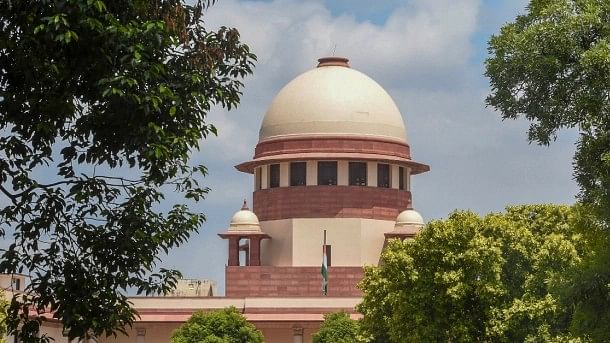
A view of the Supreme Court.
Credit: PTI File Photo
New Delhi: The Centre on Tuesday contended before the Supreme Court that the Aligarh Muslim University surrendered its minority character when it was conferred with the university status under the 1920 AMU Act.
A seven-judge led by Chief Justice of India D Y Chandrachud and comprising Justices Sanjiv Khanna, Surya Kant, J B Pardiwala, Dipankar Datta, Manoj Misra and Satish Chandra Sharma, decided to consider the contention while hearing pleas in connection with the minority status of AMU.
Solicitor General Tushar Mehta said referred to a predominantly national and non-minority character of the university from the very inception.
The bench asked if the Aligarh Muslim University Act, 1920, does have the consequence of abrogating its status as a denominational institution governed by a religious minority.
Mehta said there were institutions during the British rule, which had reputation and granted degrees except they were not under the British crown like the Scottish College, Roorkee College etc. he said there were several institutions choose not to align with the British. He said that when an institution agrees to the terms and conditions of the government and chooses to be dissolved, its earlier status is relinquished.
"What are the indicia to indicate that when AMU was conferred with the university status that it surrenders its minority status. That mere fact that it is given a university (status) does not amount to the surrender of minority status. We have to independently see whether by the Aligarh Muslim University Act, 1920, a denominational character of AMU was lost,” the bench asked.
Mehta cited correspondence between the British government and AMU regarding its minority status, the debates in the imperial Parliament where a bill was introduced and it was on surrendering denominational character.
Referring to the apex court judgment in Azeez Basha case, Mehta said it says that after the Act came into effect, it cannot claim minority status.
Senior advocate Rajeev Dhavan, representing the AMU, said the word surrender is only used in respect of property (not minority status). Senior advocate Rakesh Dwivedi, citing the book The Loyal Musalman authored by Sir Syed Ahmad Khan, said he started this from primary school to AMU and the whole purpose of AMU was to create a body of educated Muslims, who are loyal subjects.
The CJI said a minority institution may set up a purely secular form of educational institution, a minority can set up an architecture college, it can set up a medical college. Mehta said he has no quarrel with this observation.
The bench said the court would examine whether the institution acquired a minority status as on January 26, 1950.
Mehta also claimed the AMU founders were loyal to the British.
“It does not deprive it of its minority character. The fact they were in alignment with the view of then imperial power does not make it any less institution founded by a minority. Founded by a minority does not mean that you have to be in opposition to the government. Today, you have minority institutions who are on the side of the government on important issues, that does not change its minority character…a minority institution may be politically aligned or may not be aligned with the government," the bench said.
Mehta said historically it had surrendered as a denominational institution.
The bench said there is a recognition now that without aid, no institution, minority or non-minority, can exist.
"Merely by seeking aid or being granted aid you don’t lose your right to claim your minority status. That is now very well settled," the bench said.
During the hearing, the bench also questioned Attorney General R Venkataramani about the enabling provision in Article 30 of the Constitution.
"An enabling provision is like Article 15 where you have a choice to make a provision. (Article) 30 is not enabling as far as the state is concerned; it is an obligation on the state. It cannot be that I as a state can decide to grant or deny you the status," the bench said.
